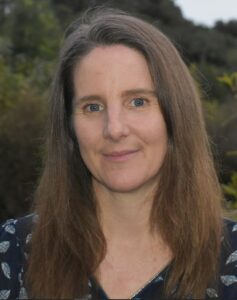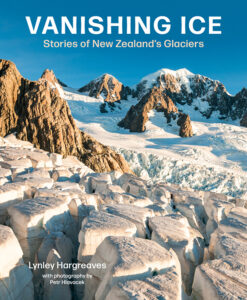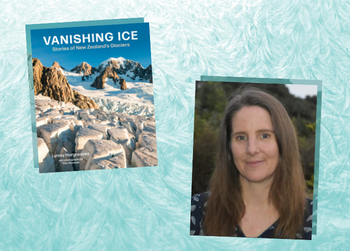Lynley Hargreaves is a science writer who lives with her glaciologist partner and two children at Te Tai Poutini on the West Coast of the South Island.
After gaining a mathematical physics degree and working for a United States physics magazine, she completed a journalism diploma. She now works in communications at Forest & Bird. Lynley has spent much of her life exploring New Zealand’s mountains. Her debut book Vanishing Ice: Stories of New Zealand’s Glaciers took many years to research and write .
Vanishing Ice brings into sharp relief the dangers our glaciers face as the world warms and our glaciers disappear at an unprecedented rate.
As Vanishing Ice reveals this unfolding disaster, it tells the stories of our glaciers through the lens of human interaction, the book carefully moves through time from first Māori discoverers to colonial explorers, mountaineers, and modern glaciologists. To do so the book investigates the way science, nature and culture interact and sometimes collide.
As well as being an important work, the volume is also very beautiful; containing numerous stunning photographs of our glacial landscapes.
Vanishing Ice joins an ever-growing canon of important and poignant modern books about Aotearoa’s natural world.
We wish to extend our heartfelt thanks and appreciation to Lynley for taking the time to answer our questions, and for providing such an illuminating insight into her world and work.
This interview was done in conjunction with Caffeine and Aspirin, the arts and entertainment review show on Radioactive FM and was conducted by Tanya Ashcroft.
 Vanishing Ice : Stories of New Zealand’s glaciers / Hargreaves, Lynley
Vanishing Ice : Stories of New Zealand’s glaciers / Hargreaves, Lynley
“Vanishing Ice brings into sharp relief the dangers our glaciers face as the world warms and our glaciers disappear at an unprecedented rate. As the book reveals this unfolding disaster, it tells the stories of our glaciers through the lens of human interaction, the book carefully moves through time from first Māori discoverers to colonial explorers, mountaineers, and modern glaciologists. To do so the book investigates the way science, nature and culture interact and sometimes collide.” ( Adapted from Catalogue)


